Masato Harada: the interview
The director talks about new film ‘Chronicle of My Mother’
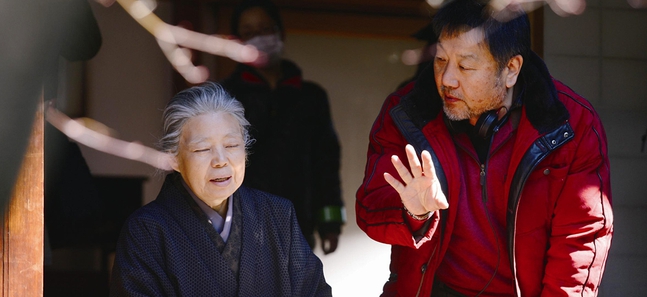
Masato Harada with Kirin Kiki on the set of ‘Chronicle of My Mother’. (C)2012「わが母の記」製作委員会
Posted: Fri Apr 27 2012
Though he's been courting international audiences for over two decades now, even shooting a pair of English-language films in the 1990s, director Masato Harada seemed condemned to be best remembered for his role as the immaculately bearded villain in The Last Samurai. That might change with Chronicle of My Mother, his first foray into the world of family dramas and one of his strongest – not to mention most accessible – films to date. Based on the autobiographical novellas by Yasushi Inoue, it centres on the relationship between successful author Kosaku Igami (Koji Yakusho) and his mother (Kirin Kiki) as she succumbs to Alzheimer's, while also finding time to follow other family members including Igami's headstrong youngest daughter (Aoi Miyazaki). A handsome, beautifully acted drama, the film won the Special Grand Prix of the jury when it premiered at last year's Montreal Film Festival, and seems a strong contender to become Japan's entry for the Best Foreign Language Film Oscar in 2013 – assuming, at least, that Harada's past criticisms of the Japanese film establishment don't get held against him.
Time Out sat down for a chat with Harada after a screening and press conference at the Foreign Correspondent's Club of Japan, and found him in typically loquacious form. He speaks here about the challenges of getting Chronicle of My Mother made, his distaste for sentimental schlock, and his abiding love of cinema – both new and old.
On sentimentality…
‘From early on, I didn't want any kind of overly sentimental film. I've seen all those Japanese films – sentimental Japanese films – didn't do well in the box office overseas. I've lived in London, I'm still living in Los Angeles, so I know the western moviegoer's response to Japanese films. I think in one of the first meetings with my producer, I made that clear: that I didn't go for any kind of sentimental stuff, or maybe a sentimental theme song. I don't want that.’
On choosing your audience…
‘One of the reasons I picked this novel was that Mr Yasushi Inoue was once considered as the Nobel Literature laureate, though he didn't win. This one, Chronicle of My Mother, was one of the two books that were read in English and in French, so in Europe and the States it's more popular than other, very famous books by him – Shirobamba and Furin Kazan, among others. So I intended to go overseas with this one.’
On seeing the funny side…
‘For the past seven or eight years, my father has been losing his memory and [succumbing to] Alzheimer's, and my mother is taking care of him alone… I help my mother, sending her bread and food and books and things like that, and she calls me once a month. And when she calls me, talking about how she takes care of her husband, it's a sort of brutal situation – but in reality something like [the amusing episodes in Chronicle of My Mother] happens, and it's a funny story, and she makes me laugh. She tells all these stories and everything, and then after 20 minutes or so she says, "Now I have the energy for another month to fight on." That's the kind of spirit I wanted to keep in this movie.’
On working with Koji Yakusho…
‘The first time we worked together was Kamikaze Taxi, and it was made almost 17 years ago, I think. This is our fifth film together, and then right after this production we made that Early Autumn TV drama, so we've worked together six times. Chronicle of My Mother is the first time I saw him crying: he never shed tears on the screen in my films, so I've never seen him crying like that.’
On editing…
‘Originally we wanted to take Chronicle of My Mother to Cannes Film Festival, so we shot and edited at the same time. My son Eugene was always on location, with his computer and everything, so in between shots I went to his room and started editing and things like that… That's something I remember Mr [Akira] Kurosawa told me: "You've got to shoot and edit at the same time." When I heard him talking about that, it was right after Rhapsody in August, and I couldn't say this to Mr Kurosawa out loud, but I was thinking, "Yeah, you can do it because the coverage is so limited." (Laughs) But it's true. He's right: it's really nice to shoot and edit. The shooting time wasn't so lengthy, I think – it was like eight, nine hours a day, sometimes it was 12 hours. Nothing like [Kinji] Fukasaku-san's production: Fukasaku-san always got brighter and more inspired after midnight.’
On funding…
‘This kind of project is really difficult to make in Japan right now. It took seven years until Shochiku came in. I have a really good relationship with several producers, but every one of them said, "Oh, forget this project. Let's do something more entertaining." ’
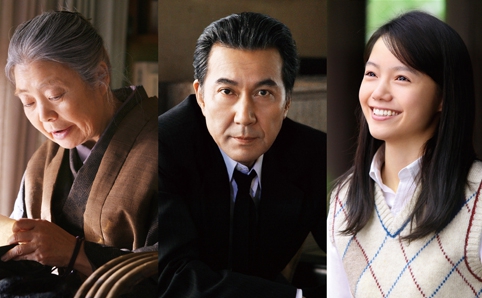
(C)2012「わが母の記」製作委員会
On making the money count…
‘The budget for this movie was about $2.5 million, and it's impossible to recreate the environment where Mr Inoue lived [for that much]. Fortunately, I had a great relationship with the Inoue family. It took about five years, but I convinced them to use the actual Inoue residence in Setagaya. The only problem was, it was about to be demolished last May, and towards the end of the year 2010 we still didn't have the green light from Shochiku. So it was a race against time: if we couldn't use the actual Inoue residence, we couldn't make this picture. Fortunately, everything worked out. And also, the villa episode – that was Mr Inoue's villa. Two major locations, we could use for peanuts: that saved a lot.’
On surviving…
‘In Japan – and also in the States, I think – it's getting tough to make decent films, or films made by original filmmakers. For example, after Bounce Ko Gals, I couldn't make any films from my original screenplay. Originality is not required here. Chronicle of My Mother is based upon Yasushi Inoue's book: that's why I was able to make it, even though Inoue's fame is fading. But if this was written by me, my own semi-autobiographical story: no movie. It's really tough now. The industry people's taste is sort of changing, and not so many people are taking risks, particularly investors and producers. You know, like the three strikes law: a long time ago, in Hollywood, if you had three flops in a row then you would be finished, but today it's just one film. And even if that one film gets made, you're lucky. The same situation's coming to Japan.’
On inspiration…
‘The very first film I saw was when my mother took me to a movie theatre when I was 5 years old, and it was Fred Zinnermann's The Search. Monty Clift plays a GI, and he helps this war orphan find his mother. Chronicle of My Mother was basically about that. When I read the book, I didn't notice that, but then as I started writing the screenplay [I thought], "Yeah, I was influenced by The Search, and that's why I was attracted to this book." That's why I wanted to make Chronicle of My Mother – the title alone is perfect for my entire life. I was introduced to movies because of my mother, and my mother is fighting because of the ageing father, and all those things gave me the great opportunity to make this film.’
On modern cinema…
‘It's not only the great classics, but contemporary movies also have an influence on me. Particularly the younger generation of filmmakers, like Andrea Arnold, Susanne Bier and Nicolas Winding Refn: all those young filmmakers, using handheld cameras, like Dogme 95 based, that kind of filmmaking… also José Padilha, from Brazil. I think I have some room to develop, to grow up, not only getting influence from the past filmmakers but contemporary filmmakers. And I love Asghar Farhadi films: A Separation is a perfect film. Even his past films – Fireworks Wednesday and About Elly – I love those films. I'm becoming a film buff again.’
On taboos…
‘It's different from Iran, maybe, but we still have all those taboos: "You can't do this." There's so many things. There are certain projects I wanted to depict, and then somebody said: "Don't do that. You are risking your career." ’
On Oscar prospects...
‘We won't know until September comes, but… I hope that [Chronicle of My Mother] would be picked up for next year's Academy Foreign Language section. But I'm not so well liked in this community, so I'm not so sure. (Laughs)’
Chronicle of My Mother is released nationwide on April 28
Tweets
- About Us |
- Work for Time Out |
- Send us info |
- Advertising |
- Mobile edition |
- Terms & Conditions |
- Privacy policy |
- Contact Us
Copyright © 2014 Time Out Tokyo










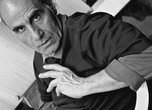

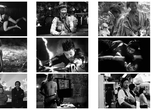
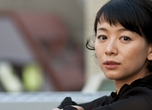
Add your comment